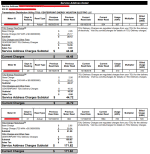Holy cow! If they are going to start charging me like that, they had better start sending me a much more detailed bill. What you see in my previous screenshot is the extent of the details they provide. If they're going to penalize me in the way you describe, I have to know what level of power draw constitutes "peak demand."
Back in 1985, I purchased a vacuum furnace for the company I worked for,,, the electric furnace could heat over a ton of steel to 1,600 degrees F in under an hour,,
Well,, when it arrived, we ran a few test loads,,, then the first "production load",,,
The next day, the facilities engineer came to my desk like a mad man,,,
It seems, the furnace, due to "peak demand" had doubled the electric bill for the business that month,,
This was a business with 2,400 employees,, and a LOT of other machinery,,,
After that,, the furnace could only be powered up certain hours of the day,,, :confused2:

